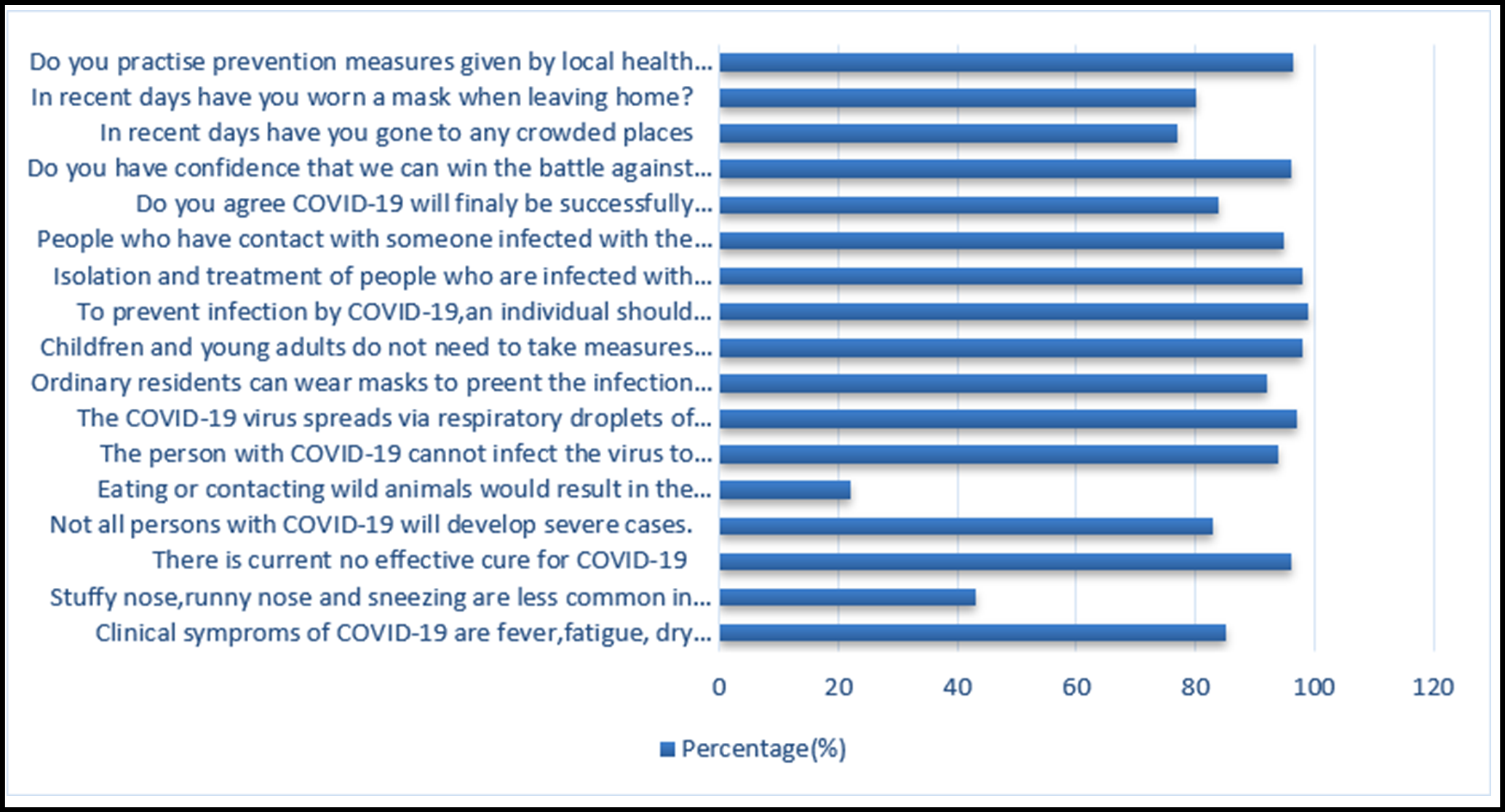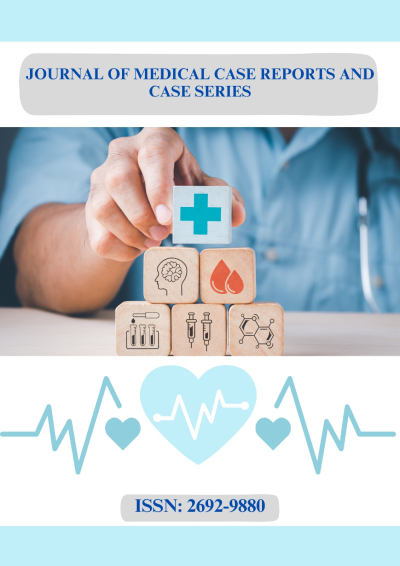Sima Rugarabamu1*, Mariam Ibrahim2, Aisha Byanaku3, Hawa Ngasongwa4
1Department of Oral health, Muhimbili National Hospital-Mloganzila, Dar-Salaam, Tanzania
2Tanzania Industrial Research and Development Organization (TIRDO), P. O. Box 23235 Dar es salaam, Tanzania
3Amref Health Africa in Tanzania, P O Box 2773 Dar es Salaam, Tanzania
4Morogoro Regional Referral Hospital Box 110, Morogoro
*Corresponding Author: Sima Rugarabamu, Department of Oral health, Muhimbili National Hospital-Mloganzila, Dar-Salaam, Tanzania
Abstract
Background
The Corona Virus Disease -19 (COVID-19) pandemic is a global health emergency that requires the adoption of unprecedented measures to control its rapid spread. Tanzanians' adherence to control measures is affected by their knowledge, attitudes, and practices (KAP) towards the disease. This study was carried out to investigate knowledge, attitudes, and practices towards COVID-19 among residents in Tanzania during the April – May 2020 period of the epidemic.
Methods: This cross-sectional study analyzes responses of self-selected Tanzanians who responded to an invitation to complete an online questionnaire. The Survey Monkey tool was used to develop the questionnaire used for data collection. The survey assessed the demographic characteristics of participants as well as their knowledge, attitudes, and practices toward COVID-19. A Chi-square analysis was used to compare proportions. Analysis of variance (ANOVA) was used to determine differences among age groups, whereas results were considered significant if the p-value was < 0.05
Results: Four hundred residents completed the survey. The mean age of study participants was 32 years, and the majority were female (n= 216,54.0 %). There were no significant differences in demographic variables). Participants with a bachelor's degree or above (n= 241, 60.3 %) had higher scores. Overall, 84.4 % (n=338) of participants had good knowledge, which was significantly associated with education level (p = 0.001). Nearly all participants (n=384, 96.0 %) had confidence that COVID-19 will be eliminated. The majority of respondents (n = 308, 77.0 %) did not go to a crowded place in recent days. Multiple linear regression analysis showed that males, age-group 16-29 years, and education of secondary or lower (OR = 1.2, CI = 1.3–1.5) were significantly associated with lower knowledge scores.
Conclusions: Our findings revealed good knowledge, optimistic attitudes, and appropriate practices towards preventing COVID-19 infection. Suggesting that community-based health education programs about COVID-19 are helpful and necessary to control the disease.
Keywords: COVID-19, Knowledge, Attitude, Practice, Tanzania
Introduction
Coronavirus disease 2019 (COVID-19) is a disease caused by a novel coronavirus that was first detected in December 2019 in Wuhan, China. It is characterized by sudden onset, fever, fatigue dry cough, myalgia, and dyspnea. Data show that (10-20 %) of the patients develop severe cases, which are characterized by acute respiratory distress syndrome, septic shock, difficult-to-tackle metabolic acidosis, and bleeding and coagulation dysfunction [1,2]. World Health Organization (WHO) declared it a public health emergency of international concern and has called for collaborative efforts to prevent its rapid spread [5]. Although clinical data have shown the overall case fatality rate of COVID-19 ranges 2-5 % worldwide, which is much lower than those of severe acute respiratory syndrome (SARS) (9.5 %), MERS (34.4 %), and H7N9 (39.0 %), pathogens continue to emerge and spread to the population at risk. The threat of more contagious and virulent variants demand public health actions to move from purely treatment activities to preventive measures practiced by the public [1-3]. The ongoing COVID-19 pandemic has spread very quickly, and to date at the time of the survey, the virus had reached over 200 countries altogether, resulting in 236,368,875 laboratory-confirmed infections and 4,826,358deaths [4].
Tanzania is among African countries that have been affected by the COVID-19 pandemic [6]. Until April 24, 2021, government authorities announced only 284 cases of COVID-19, among them 256 were in stable condition, seven in special care, 37 recovery, and 10 deaths [7]. Dar-es-salaam City and Zanzibar Island have the highest number of cases. Other regions affected were Mwanza, Dodoma, Pwani, Kagera, Manyara, and Morogoro [8]. Several measures have been adopted to control COVID-19 transmission in Tanzania, including closing all schools and universities, observing physical distancing, prohibiting mass gatherings, isolating suspected cases, and caring for confirmed and suspected cases. Moreover, Tanzania residents were obliged to perform handwashing with soap and running water or alcohol-based hand sanitizer and urged to wear face masks outside their homes.
To effectively control COVID-19 in Tanzania., individuals' adherence to these control measures is essential [9-10]. Reports from different outbreaks recommend that knowledge and attitudes towards the infectious disease can sometimes result in a level of panic among the population and complicate endeavors to prevent the spread of the disease [9-12].
There is an urgent need to understand the public's awareness of COVID-19 in Tanzania to facilitate outbreak management of COVID-19. This study was conducted to investigate knowledge, attitudes, and practices (KAP) towards COVID-19 among residents in Tanzania during the March –April 2020 period of the pandemic.
Material and Methods
Study design
This cross-sectional survey took place from the 15th to the 28th of April 2020.
Sample size and selection
Participants were self-selected when they choose to answer the questionnaire. A total of 5,000 residents were assumed to actively use media connections. Calculation using statistical software gave a minimum sample of 384 [13]. To adjust for non-responders 400 residents conveniently receive the link with the Questionnaire [14].
Data collection
Due to the infectious nature of disease transmission, online survey forms were used to collect the data. The Survey Monkey tool was used to develop a link and KAP questionnaire for data collection.
The questionnaire consisting of 20 questions was were prepared by following the WHO guide for KAP questionnaire development. This template was modified and adapted to the Swahili language. It was then validated and piloted according to guidelines for clinical and community management of COVID-19 by the Tanzanian Ministry of Health Community Development, Gender, Elderly, and Children. Demographic variables included age, gender, and education level. There were 17 KAP questions regarding clinical presentations, transmission routes, and control of COVID-19. These questions were answered either as Yes/No, true/false, or “I don't know”. The total score ranged from 0 to 17, with a higher score indicating a better knowledge of COVID-19. Participants could provide only one response per question. The reliability of the knowledge, attitude, and practice questionnaires was checked, and the values of Cronbach’s alpha were 0.81, 0.88, and 0.86 respectively, indicating acceptable internal consistency.
Data analysis
Response data were recorded and analyzed using SPSS 17. Results were considered significant if the p-value was < 0.05.
Results
Socio-demographic characteristics of the study population
A total of 400 participants completed the survey. The range of the age of the participants was 18 to 75 years, and the mean (SD) was 32 (10.3) years. Women represented 54 % of the participants. The majority of the participants (n=242, 60.3 %) had a bachelor's degree or above. Participant socio-demographic characteristics are given in Table 1.
Table 1: Sociodemographic characteristics of study participants (N=400)
|
Variables |
Frequency n (%) |
|
Sex |
|
|
Female |
216 (54.0) |
|
Age (years) |
|
|
16-29 |
34 (08.5) |
|
30-49 |
247 (61.7) |
|
50-59 |
114 (28.5) |
|
60+ |
5 (01.3) |
|
Education Level |
|
|
Primary |
68 (17.0) |
|
Secondary |
90 (22.5) |
|
College/University |
242 (60.5) |
Knowledge regarding COVID-19
Overall, 84.4 % of the participants scored above the mean. The range of correct answers was two to ten the mean (SD) score was 9.3 (2.0), and the median was nine. A score above nine was considered a good knowledge level. 60.5 % of the degree holder score above 9, Figure 1.

Figure 1: Percentage distribution of correct scores.
The range of percent of correct answers was 70.2-98.6 % (Table2). The mean (SD) score was 8.7 (1.6). Results varied between genders and among age groups and education levels (P < 0.001).
Males, age group of 16-29 years, with a bachelor’s degree or lower were significantly associated with lower knowledge scores Table 2.
Table 2: Distribution of mean COVID-19 knowledge by demographic variables
|
Characteristics |
Knowledge Level n |
Mean score (SD) |
P-Value |
|
|
|
Good |
Poor |
|
|
|
Sex |
|
|
|
|
|
Male |
151 |
33 |
8.5 (2.0) |
|
|
Female |
157 |
59 |
8.9 (1.3) |
<0.001 |
|
Age-group (years) |
|
|
|
|
|
16-29 |
30 |
4 |
8.(1.9) |
|
|
30-49 |
215 |
52 |
9.1(1.2) |
<0.001 |
|
50+ |
90 |
36 |
8.9 (1.3) |
|
|
Education |
|
|
|
|
|
Primary |
30 |
38 |
7.7 (2.4) |
<0.001 |
|
Secondary |
43 |
47 |
8.8 (1.5) |
|
|
College/University |
235 |
7 |
10.0 (1.2) |
|
Attitudes and Practices Regarding COVID-19
The majority of the respondents agreed that COVID-19 would be successfully controlled (n=384, 96 %). The attitude towards the final success in controlling COVID-19 had no significant differences across genders and education levels (P<0.71). The majority of the participants had not visited crowded places (n=308, 77.0 %) and wore masks when going out (n=352, 80.0 %) in recent days. All participants (n=392, 98.0 %) correctly identified that COVID-19 is transmitted through respiratory droplets and that factors such as chronic illnesses and obesity can lead to serious morbidity (Figure 1).
Discussion
This is the first online cross-sectional study examining KAP towards COVID-19 among Tanzania residents. In this study, 84.4% of the participants had a good knowledge of COVID- 19, which is comparable with a study conducted in China where more than seventy percent of study participants had good knowledge. Previous studies from different countries have identified good knowledge in infection control as a predictor of good practice [17,18]. These studies also highlighted that major gap in disease knowledge could result in uncertainties and non-astringent control measures [19].
Most of the participants had confidence that COVID-19 will be contained and had a certainty that we can win the fight against the disease. This attitude could have been attributed to positive practice with the majority reporting not visiting crowded places and wearing masks whenever they go out of their homes. Furthermore, all reported adhering to preventive measures as instructed by their national health care authority. The findings are useful for policymakers to consider the need for a comprehensive specific group target health education program for COVID-19 prevention and control.
The finding of a high level of knowledge among residents is a good predictor of a positive impact initiative to involve the community in a fight for COVID-19. However, the results may have been affected by the convenience sampling method used. The majority of participants (n=278, 69.5 %) held a secondary degree or higher, and all participants had access to the internet. These are the privileged group who would actively seek information on this infectious disease from various channels of information, including the official website of the Ministry, and the WhatsApp account. The same study should be conducted among vulnerable populations or underprivileged communities.
The strength of this study lies in its large sample recruited during the peak of the COVID-19 outbreak. Nevertheless, compared to the population statistics, our sampling method picked middle and high economic societies, we speculate that knowledge might have been over overestimated, and attitude and practice underestimated. A community-based national cross-sectional study is recommended when an outbreak is over.
Conclusions
Our findings emphasize the need to investigate the KAP towards COVID-19 among Tanzania residents of low socioeconomic status. This will encourage an optimistic attitude and maintain safe practices. Community-based health education programs about COVID-19 are likely to be helpful and necessary approaches to control the disease.
Acknowledgments: We are grateful to all participants who took the time to fill out the questionnaire.
References
- The Novel Coronavirus Pneumonia Emergency Response Epidemiology Team. (2020) The epidemiological characteristics of an outbreak of 2019 novel coronavirus diseases (COVID-19) in China. China CDC Wkly. 2(8): 113-122.
- Chen N, Zhou M, Dong X, Qu J, Gong F, et al. (2020) Epidemiological and clinical characteristics of 99 cases of 2019 novel coronavirus pneumonia in Wuhan, China: a descriptive study. Lancet. 395(10223): 507-513.
- Munster VJ, Koopmans M, van Doremalen N, van Riel D, de Wit E (2020) A Novel Coronavirus Emerging in China - Key Questions for Impact Assessment. N Engl J Med. 382(8): 692-694.
- World Health Organization. Coronavirus disease (COVID-19) situation reports. 2020.
- World Health Organization. The 2019-nCoV outbreak is an emergency of international concern. 2020.
- Ndalu D (2020) Covid-19: Tanzania Reports 30 New Cases. The East African.
- Materu B (2020) Covid-19: Tanzania's Cases Soar to 254. The East African.
- “Tanzania.” KPMG.13Apr.2020.
- National Health Commission of the People's Republic of China. A protocol for community prevention and control of the 2019 novel coronavirus (2019nCoV) infected pneumonia (trial version)2020.
- Taber KS. (2018) The Use of Cronbach's Alpha When Developing and Reporting Research Instruments in Science Education. Research in Science Education. 48: 1273–1296.
- Zhou X, Xiu C, Chu Q. (2004) Prevention and treatment knowledge and attitudes towards SARS of urban residents in Qingdao. Prev Med Trib. 10: 407–8.
- Liu Z, Gao H, Zhang (2004) Prevention and treatment knowledge towards SARS of the urban population in Jinan. Prev Med Trib. 10: 659–60.
- Dean AG, SULLIVAN KM, Soe MM, (2013) OpenEpi: OpenSource Epidemiologic Statistics for Public Health.
- Survey Monkey. Login to Your Account.
- Yimer SA, Holm-Hansen C, Bjune G (2012) Assessment of knowledge and practice of private practitioners regarding tuberculosis control in Ethiopia. J Infect Dev Ctries. 6(1): 13-19.
- Vandan N, Ali M, Prasad R, Kuroiwa C (2009) Assessment of doctors' knowledge regarding tuberculosis management in Lucknow, India: a public-private sector comparison. Public Health. 123: 484-489.
- Chen S, Qiu Z, Xu L, Chen J, Lin Y, Yang Y. et al. (2003) People groups' responses to SARS in the community. Chinese Rural Health Service Administration. 23: 15-8.
- Pawlowski B, Atwal R, Dunbar R (2008) Sex Differences in Everyday Risk-Taking Behavior in Humans Evolutionary Psychology. 6: 29-42.
- Zhong BL, Luo W, Li HM, Zhang QQ, Liu XG, et al. (2020) Knowledge, attitudes, and practices towards COVID-19 among Chinese residents during the rapid rise period of the COVID-19 outbreak: a quick online cross-sectional survey. Int J Biol Sci. 16(10): 1745-1752.



